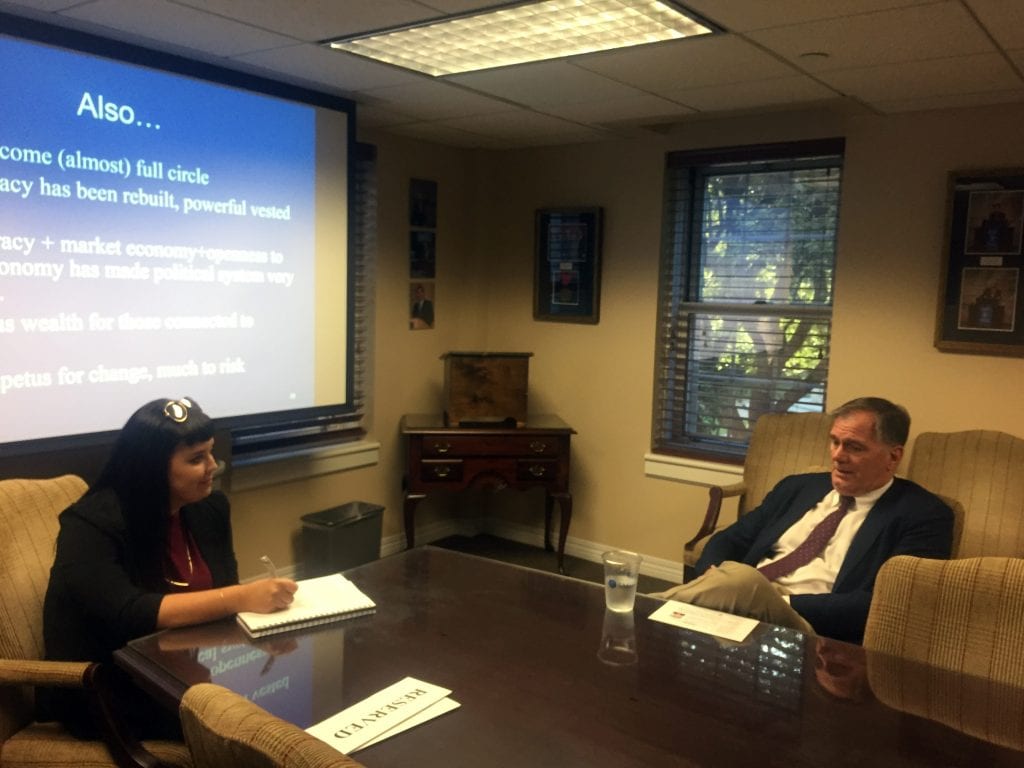
China of the last four decades, with its heavily centralized bureaucracy and its exponential economic growth, is a far cry from the first three decades of the People’s Republic of China, yet the remnants of the Maoist era still greatly affect post-Mao China. Mao’s policies and campaigns such as the Anti-Rightist Movement, the Great Leap Forward, and the Cultural Revolution profoundly influenced China’s development. In his talk at the Tower Center Sept. 29, Dr. Andrew Walder, a prominent sociologist from Stanford University, found that precedents set by the Cultural Revolution have helped further China’s development through political reform.
Four conditions for reform
The delegitimization of Maoism, and Deng Xiaoping’s gradual and experimental economic reform were made possible by four circumstances that necessitated such change: (1) The Cultural Revolution destroyed the bureaucracy of the Party. China had been reduced to a military dictatorship, a disorganized mess, that greatly contrasted the long-established Soviet bureaucracy. (2) China was so backward it was falling behind competitors. (3) Deng Xiaoping was an established authority within the Party because of Mao’s initial support. (4) The extremism of the Cultural Revolution led Mao to denounce the USSR and strengthen China’s relationship with the U.S.
China’s bureaucracy destroyed
Paradoxically, one reason the Chinese Communist Party survived was due to the massive failure of the Cultural Revolution. Walder juxtaposed these circumstances against the conditions of the Soviet Union to show just how different China and Russia were in the 1970s. Russia was industrialized and bureaucratic while China faced starvation and a lack of education. “If asked which communist power would be a modern economic power you would have said Russia; you would have been wrong,” Walder said.
The bureaucracy of the CCP was not rebuilt until after Mao’s death in 1976. The Party was held together only by the military from 1967 to 1973. Education “missed an entire generation” of Chinese youth. Simply put, China was left longing for something new after the trauma of the Cultural Revolution. They had nothing to lose and were therefore open to large-scale reform. Conversely, the Soviet Union rested upon a strong central bureaucracy. For them, political reform was too risky.
Backwardness
The second condition, China’s “backwardness”, also encouraged economic reform. China was a flat line of economic growth in comparison to major powers of the time. Its economy was comparable to that of India, Pakistan or Bangladesh especially during the Great Leap Forward and the Cultural Revolution. Market failure created a need for a “second economy.” This economy was a self-reliant and informal system that highlighted China’s underlying entrepreneurial spirit. It was also during this time that the guanxi economy began to spread. Local officials would host unofficial markets for goods.
The Chinese were relying on technology transported from USSR in the 1950s. There had been no technological advancements or upgrades since the Great Leap Forward. Additionally, Chinese research and development was destroyed by the rustication of intellectuals and the lack of academic exchanges with the outside world. In comparison, the Soviet Union was the second largest economy until 1988 when it was surpassed by Japan. It was a strong military power with advanced scientific technology and high economic growth rates.
New leadership
The third condition was China’s leadership. The last years of Mao’s life gave Deng Xiaoping the power he needed for future market reform. He became identified for rebuilding the party state. Deng had strong revolutionary ties and was largely regarded as a national authority. He is historically noted as the father of the revival of China and market reform. In contrast, Mikhail Gorbachev, the Soviet leader at the time, was a relatively new member of the Party and a weak leader. When the USSR began to slip, Gorbachev lacked the authority or power to save the Soviet Union or the Party.
Turn to the West
The fourth and final condition necessary to bring about modern Chinese success was the “turn to the West”. After the Sino-Soviet split and Richard Nixon’s visit to China, the CCP helped forge an anti-Soviet coalition alongside the United States. This led to technological investment by the West from both Japan and the U.S. As a result, the Soviet Union was increasingly isolated, ultimately leading to the collapse of the USSR. By turning to the West, China opened itself and its economy to the world, ushering in a new era of Chinese growth.
China has nearly come full circle in less than half a century. Today, China is highly centralized with great economic success and nationalism. The CCP’s modern obsession with stability comes from the Mao Era’s history of instability. This leaves today’s leaders, particularly Xi Jingping, thinking that reform is nearly impossible. Like the Soviets in the 1970s, there’s a lot to lose. After almost 40 years of strong bureaucratic management, heavily integrated vested interests block reform despite Xi’s Anti-Corruption Campaign. With enormous wealth for those connected to the system, heavy financing from state banks, and general income inequality, there’s little impetus for further change.
 Claire Huitt is a senior at Southern Methodist University triple majoring in public policy, economics, and political science with a focus on international relations and the Asian Pacific. She is a Bauer Scholar in Political Science, Hamilton Scholar, Engaged Learning Fellow, a representative of IGNITE Women in Politics, Chair on Asian Pacific Relations with the Tower Center Student Forum, Dedman School of Law Pre-Law Scholar, New Century Scholar, and a member of the University Honors Program. After graduation Claire intends to attend law school and pursue a career in international law and foreign affairs.
Claire Huitt is a senior at Southern Methodist University triple majoring in public policy, economics, and political science with a focus on international relations and the Asian Pacific. She is a Bauer Scholar in Political Science, Hamilton Scholar, Engaged Learning Fellow, a representative of IGNITE Women in Politics, Chair on Asian Pacific Relations with the Tower Center Student Forum, Dedman School of Law Pre-Law Scholar, New Century Scholar, and a member of the University Honors Program. After graduation Claire intends to attend law school and pursue a career in international law and foreign affairs.